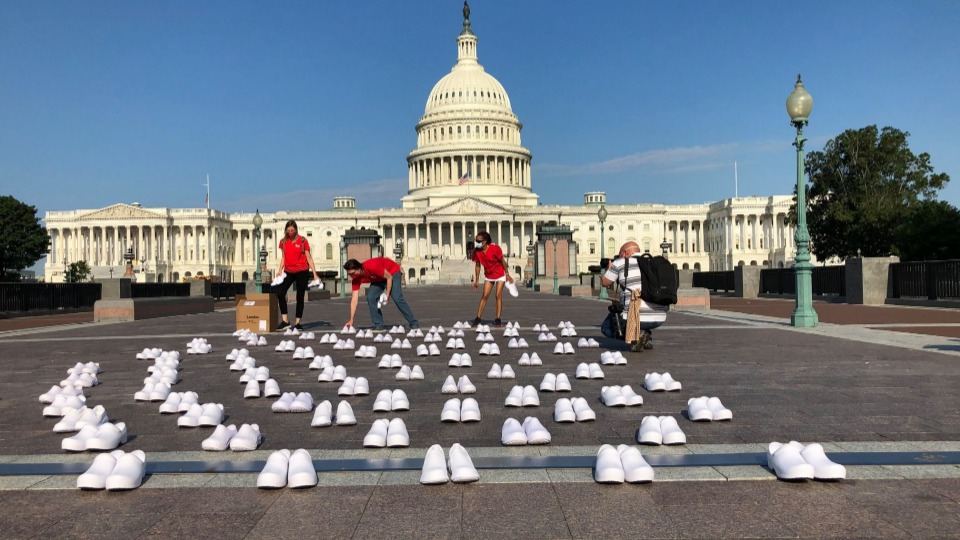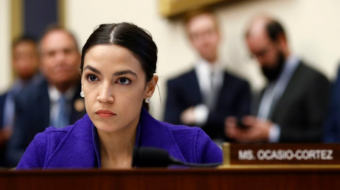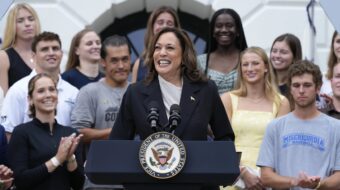
WASHINGTON—Former GOP Oval Office occupant Donald Trump killed the equivalent of every man, woman, and child in Tucson, Ariz. Well, not literally.
The death toll as of midnight March 31, 54 weeks after the coronavirus pandemic hit the U.S., stood at 550,955 –more than in any other country in the world. Tucson’s 2019 population, according to Census Bureau calculations: 548,073.
Dr. Deborah Birx, formerly one of two top medical advisers to Trump’s coronavirus task force, recently admitted the first 100,000 of those deaths were unavoidable, once the virus hit the U.S., in early January 2020, or possibly before.
That’s because those people died before the U.S. had time to gear up for the fight, assuming it had moved against the virus, officially Covid-19, at the first warning.
The rest were not
But the rest, Birx said, were not. The illnesses and deaths were due to the Trump regime’s refusal to take the pandemic seriously, to order anti-virus measures immediately, to marshal a coordinated federal response to the contagion.
It also refused to shut down business to stop superspreading of the virus. And after reviewing a 474-page bounty of Trump agency memos on the virus, Public Citizen attorney Adam Culver concluded one big reason was corporate clout.
“The focus remained on minimizing disruption to profits, not minimizing harm to human lives,” he said.
Trump also left states, cities, and workers to fend for themselves in competing for scarce supplies of virus detection and protective gear, such as testing kits, swabs, syringes, N95 masks, and respirators.
In one example, Gov. Larry Hogan, R-Md., had to sneak Korean-made testing kits in by plane at midnight to an airfield in rural Pennsylvania, to prevent Trump government agents from seizing the kits if they arrived at Thurgood Marshall-BWI International Airport outside Baltimore. And Gov. J.B. Pritzker, D-Ill., a multimillionaire, chartered two planes to fly N95 masks from China to Chicago.
And Trump refused to invoke the Defense Production Act to force firms to make that Personal Protective Equipment (PPE), which would have saved tens of thousands of lives—or to get drug makers immediately to start vaccine R&D. That came later.
In addition, Trump’s White House signaled to the Occupational Safety and Health Administration not to enforce job safety and health laws against firms that didn’t protect their workers and customers, much less write and impose an Emergency Temporary Standard forcing them to do so (see separate special report story).
Organized labor noticed the Trump regime’s inactions and especially who got hurt the most: “Essential” workers and workers of color, two groups that greatly overlap.
The AFL-CIO, National Nurses United, and other unions sued to force OSHA to issue that temporary and immediate anti-virus standard—and lost to two GOP-named federal court judges last June 11. One was a former Trump Office of Management and Budget administrator of regulatory affairs. The Chamber of Commerce sided with Trump’s OSHA and against protecting workers. OSHA never wrote the standard.
“Covid-19 exposures and illnesses disproportionately impact individuals in low-wage jobs, who may also work multiple jobs, and people of color,” the AFL-CIO Executive Council said on March 11. Trump and his minions “made the situation much worse,” the fed said.
“It neglected the health of the nation and left working people with no protections. It refused to issue emergency workplace safety standards. It refused to centralize supply and distribution of critical respirators and other personal protective equipment (PPE), medical equipment, testing, and vaccines” to ensure workers and people “at greatest risk” got them first.
“There was no focus on ensuring access to the adequate levels of protections that would keep workers safe from a highly contagious virus spread through airborne transmission. Critical PPE, including respirators, still have not been adequately provided to workers in high-risk occupations who desperately need them.”
Nurses deal upfront
The nation’s nurses, who deal upfront personally with the pandemic’s ravages on their patients and themselves—more than 300 NNU members have died—were more outspoken.
“The richest country in the world will call nurses heroes without even bothering to invest in mass producing N95 respirators and other equipment to keep nurses alive,” NNU Executive Director Bonnie Castillo, RN, said last May when the union released the second in a series of surveys of nurses about protection—or lack of it–of those “essential” workers.

Before that, NNU staged protests against Trump and congressional inaction against the pandemic. They lined up empty pairs of nurses’ shoes, one for each nurse the virus killed, first in front of the White House and then later at the U.S. Capitol. As of Feb. 11, that total was 329, out of 3,200 dead health care workers overall.
“Nurses signed up to care for their patients. They did not sign up to die needlessly on the front lines of a pandemic,” Castillo said. “Our message to employers and the Trump administration is: Platitudes are empty without protections. For our sake, for the public’s sake—give us PPE.”
That message was disregarded, at best. When Dr. Birx and Dr. Anthony Fauci, Director of the National Institute of Allergy and Infectious Diseases, tried to get Trump to take the pandemic seriously, the White House denizen brushed them off.
The story behind the brush-off is even worse.
Some 474 pages of E-mails and memos Public Citizen forced out of Trump’s regime through the Freedom of Information Act showed politically appointed ideologues atop HHS viewed the pandemic as a public health issue, but also as a PR problem.
And the House Select Committee on the Coronavirus released Trump government letters and memos showing the undue corporate influence on federal health officials responding to the pandemic—a point reinforced by the HHS communications.
Most dealt with the food industry and plant inspections, including at the infamous pork production plant in Sioux Falls, S.D. None was with workers or the top union representing them, the United Food and Commercial Workers.
The memos and e-mails consisted of either interagency memos or communications with corporate lobbyists—or, in one redacted letter setting up a meeting for a lobbyist, Trump Vice President Mike Pence.
“It is heartbreaking to see the callousness of the meatpacking industry, pushing back against basic safety measures that could have saved hundreds of lives and helped contain the pandemic,” Culver said in an accompanying statement.
“While we knew meatpacking companies did not take adequate measures to protect their workers and the communities they lived in from the threat of COVID-19, these documents show the industry actively pushed back against the few steps” Trump’s Agriculture Department took to protect both workers and federal Food Safety and Inspection Service inspectors.
Lobbied unsuccessfully
Before that, meatpackers unsuccessfully lobbied Trump’s White House to ban lawsuits from workers and customers who caught the virus due to packers’ lack of protections, Culver said. When that didn’t work, corporate lobbies turned to other strategies endangering the essential workers and the federal inspectors.
In one example, the meatpackers’ lobby protested USDA’s ruling not to send an FSIS inspector exposed to the virus into other plants. “We all may have been exposed at this point,” the North American Meat Institute told USDA last April 15. And a beverage lobby told USDA that “unless state or local governments require it, social distancing should not be a tool” for protection, not mandated.
The House Select Subcommittee On The Coronavirus Pandemic, chaired by Rep. James Clyburn, D-S.C., found similarly damning evidence. But instead of corporate clout, the panel turned up Trump regime manipulations:
- Medical researcher Paul Alexander, a top Trump political appointee at HHS, ordered the Centers for Disease Control last August to weaken testing guidance “for the express purpose of hiding evidence of the rapidly spreading virus, in order to quickly reopen businesses while allowing the virus to spread undetected.” CDC is part of HHS.
Over objections from Drs. Birx and Fauci, Trump’s coronavirus task force ordered CDC to change the guidance to avoid identifying “asymptomatic (virus) infections in low-risk people.” Positive tests in asymptomatic people forced them to quarantine. That was “preventing the workforce from working” and would not allow schools to “optimally re-open,” Alexander’s memo, which the panel released, said.
- Even before that, on May 16—three months after the pandemic proclamation—Trump HHS political appointees created a model to “justify rapidly reopening businesses.”
HHS Assistant Secretary Michael Caputo wrote: ‘I know the president wants us to enumerate the economic cost of not reopening. We need solid estimates to be able to say something like: 50,000 more cancer deaths! 40,000 more heart attacks! 25,000 more suicides! 155,000 more trauma deaths! 240,000 hospitals will close! 400,000 heath [sic] care workers jobless! 170,000 more high school dropouts! Etc.’” Alexander responded with a politically manipulatable model. “I can manipulate models to make it what I want…we all do.”
The House committee noted Trump HHS officials pushed the federal Food and Drug Administration, also part of HHS, to OK questionable anti-virus treatments. In particular, Trump and his appointees touted hydroxychloroquine. That 75-year-old drug is used to treat malaria, lupus, and arthritis.
“I want to help the administration” by showing that drug worked, Alexander told the FDA. “We are being fought by the other side and media which is horrendous.” The National Institute of Allergies and Infectious Diseases reported Trump and his minions were dead wrong.
In November, after testing hydroxychloroquine versus a placebo on 479 coronavirus patients in 34 hospitals—60% of them patients of color—the agency reported no impact either way. An earlier, smaller study of Covid-19 patients and the drug found it increased the risk of some side effects, notably heart attacks.
And an independent medical panel told the institute a British mass study of the drug showed “no decrease in 28-day (virus) mortality.” It added another mass study, in Brazil, found “more adverse events” among coronavirus patients who got hydroxychloroquine than among patients “who received standard care.” If Trump knew of those results, he ignored them.
The story isn’t over. Clyburn’s committee seeks more documents about the Trump regime’s deliberations and “political interference” in dealing with the pandemic. “The Trump administration repeatedly obstructed the Select Subcommittee’s investigations, even after Chairman Clyburn issued subpoenas to then-HHS Secretary Alex Azar and then-CDC Director Robert Redfield in December 2020,” the panel’s mid-March statement said.
Like free stuff? So do we. Here at People’s World, we believe strongly in the mission of keeping the labor and democratic movements informed so they are prepared for the struggle. But we need your help. While our content is free for readers (something we are proud of) it takes money — a lot of it — to produce and cover the stories you see in our pages. Only you, our readers and supporters, can keep us going. Only you can make sure we keep the news that matters free of paywalls and advertisements. If you enjoy reading People’s World and the stories we bring you, support our work by becoming a $5 monthly sustainer today.












Comments